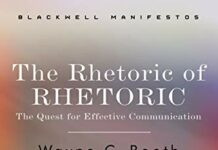
Ebook Info
- Published: 1975
- Number of pages: 310 pages
- Format: PDF
- File Size: 24.40 MB
- Authors: Wayne C. Booth
Description
Perhaps no other critical label has been made to cover more ground than “irony,” and in our time irony has come to have so many meanings that by itself it means almost nothing. In this work, Wayne C. Booth cuts through the resulting confusions by analyzing how we manage to share quite specific ironies—and why we often fail when we try to do so. How does a reader or listener recognize the kind of statement which requires him to reject its “clear” and “obvious” meaning? And how does any reader know where to stop, once he has embarked on the hazardous and exhilarating path of rejecting “what the words say” and reconstructing “what the author means”? In the first and longer part of his work, Booth deals with the workings of what he calls “stable irony,” irony with a clear rhetorical intent. He then turns to intended instabilities—ironies that resist interpretation and finally lead to the “infinite absolute negativities” that have obsessed criticism since the Romantic period. Professor Booth is always ironically aware that no one can fathom the unfathomable. But by looking closely at unstable ironists like Samuel Becket, he shows that at least some of our commonplaces about meaninglessness require revision. Finally, he explores—with the help of Plato—the wry paradoxes that threaten any uncompromising assertion that all assertion can be undermined by the spirit of irony.
User’s Reviews
Editorial Reviews: About the Author Wayne C. Booth (1921–2005) was the George M. Pullman Distinguished Service Professor Emeritus in English Language and Literature at the University of Chicago. His many books include The Rhetoric of Fiction and For the Love of It: Amateuring and Its Rivals, both published by the University of Chicago Press.
Reviews from Amazon users which were colected at the time this book was published on the website:
⭐Analyzing irony, dealing with the myriad ways in which it affects culture, language, and identity, has been an important aspect of critical and social theory since the time of the Greeks; it picks up steam during the Romantic period,continues on through the 20th century, and shows no signs of slowing down in the 21st. And yet, despite, or perhaps because of its relevance, irony is a concept that invites controversy. For some irony relegates language, meaning, and truth to the void; for others it points towards a truth that transcends the contingencies of life, culture, language. Irony is an incredibly complex, incredibly frustrating concept, slipping through the fingers of even the sublest minds. In “A Rhetoric of Irony,” Wayne Booth takes up the challenge. Did he succeed? The five stars should give you an idea of where I stand on that question. His study is wide ranging, covering irony as literary trope, rhetorical framework, and social theory. He looks at what irony can tell us about the relationship between the author and the reader; he investigates the question of authorial intent, and what it means for meaning to completely discount it; he questions popular theories of irony that dispatch with meaning and intent; and he uses Plato to argue for irony as, not a destroyer of values, but a signpost to values akin to universal. Despite the scope and complexity, Booth never obfuscates, never occludes key points with careless ambiguity. His language is clean, his propositions, sound. As for Booth’s audience, he deals with the multi-faceted nature of irony with a clarity that makes it accessible to anyone willing to read attentively. That said, scholars and students working in the humanities are likely Booth’s intended audience.But this book isn’t just for people who are interested in irony; it’s for the serious reader, always open to new, enriching perspectives; it’s for anyone interested in knowledge, aware, knowing that they don’t know quite enough, that they’ll never know quite enough. If you’re reading this review, perhaps this books for you. I unequivocally recommend it.
⭐Almost everything can be construed as ironic, as Wayne C. Booth shows, but there are different types and degrees of irony and different works of literature have used irony in different ways. This book is essential for understanding literature and especially essential for understanding modern fiction.Of course, irony depends upon a reader capable of seeing the irony. This book isn’t just for English Majors. It’s for everyone who wants to be able to make judgments about the news, movies, paintings, etc. for themselves rather than just accept what is given at face value. You won’t see the same world out there after reading this book.
⭐Great book- it was very helpful in my dissertation.
Keywords
Free Download A Rhetoric of Irony (Phoenix Books) in PDF format
A Rhetoric of Irony (Phoenix Books) PDF Free Download
Download A Rhetoric of Irony (Phoenix Books) 1975 PDF Free
A Rhetoric of Irony (Phoenix Books) 1975 PDF Free Download
Download A Rhetoric of Irony (Phoenix Books) PDF
Free Download Ebook A Rhetoric of Irony (Phoenix Books)
